THE UNITED NATIONS’ 17 SDGS
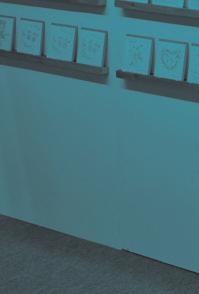

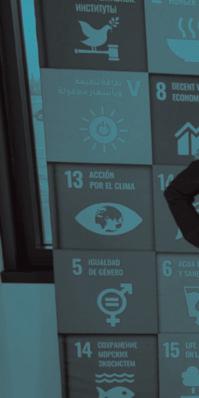
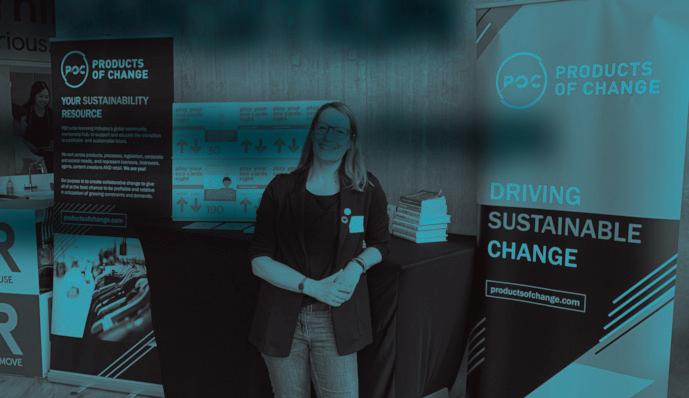




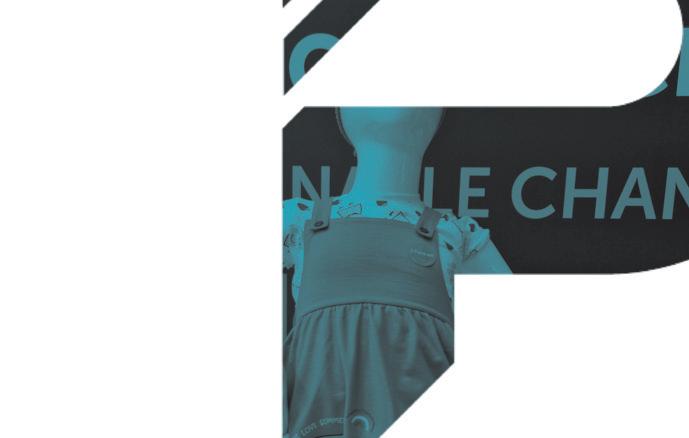



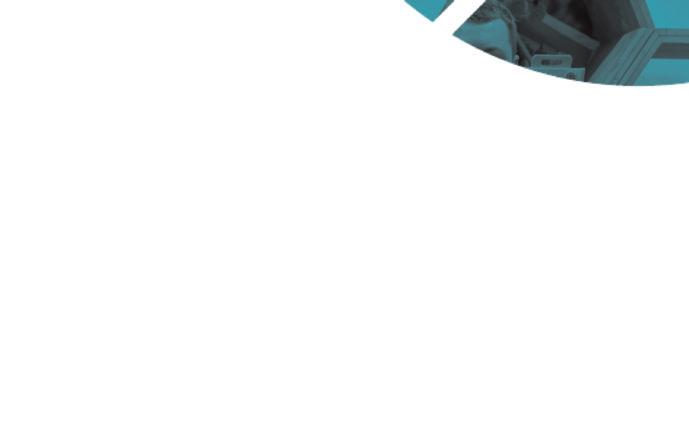







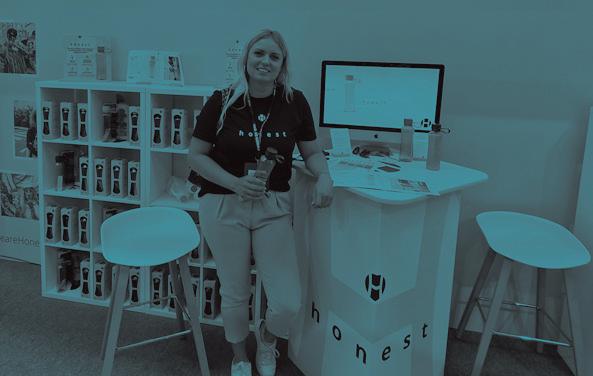


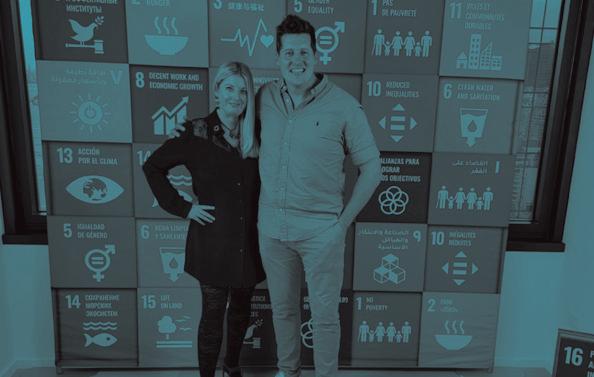
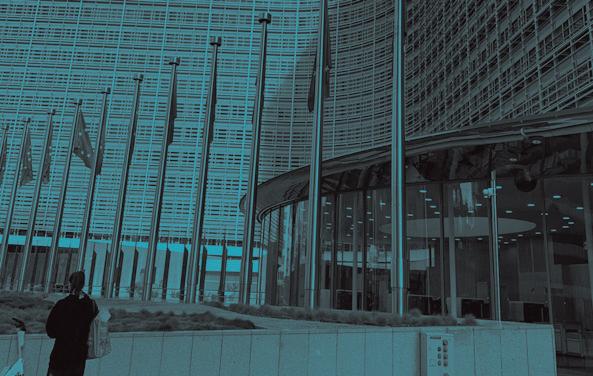



INDUSTRY TRANSITION














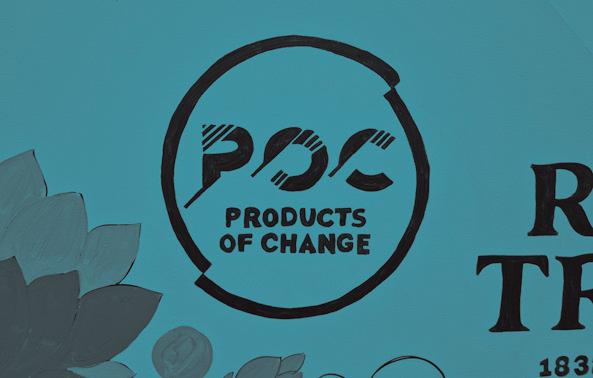








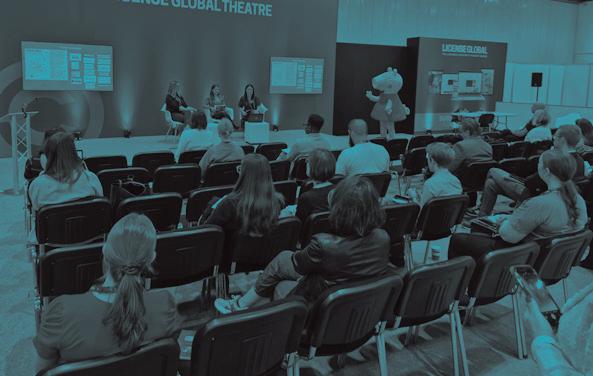





PEOPLE PURPOSE DRIVING SUSTAINABILITY REGENERATIVE BUSINESS PRODUCTS OF CHANGE AUTUMN 2022: SUSTAINABILITY EDIT THE SUSTAINABILITY IN LICENSING CONFERENCE Putting sustainability on your agenda from the Royal Geographical Society People, planet, purpose, and profit
Positive impact via the Media Compact Primark Cares puts purpose back on the high street
The LEGO Group shares its biggest changes Member news and industry views
FUTURE-THINKING CAMPAIGN THAT EMPHASISES THE PLANET AND ITS INHABITANTS.

Smiley’s mission to create a happier, kinder, more conscious world - Future Positive® is a first-of-itskind initiative created to work with global brands at tackling worldwide social and climate injustice through transparent and sustainably produced products.
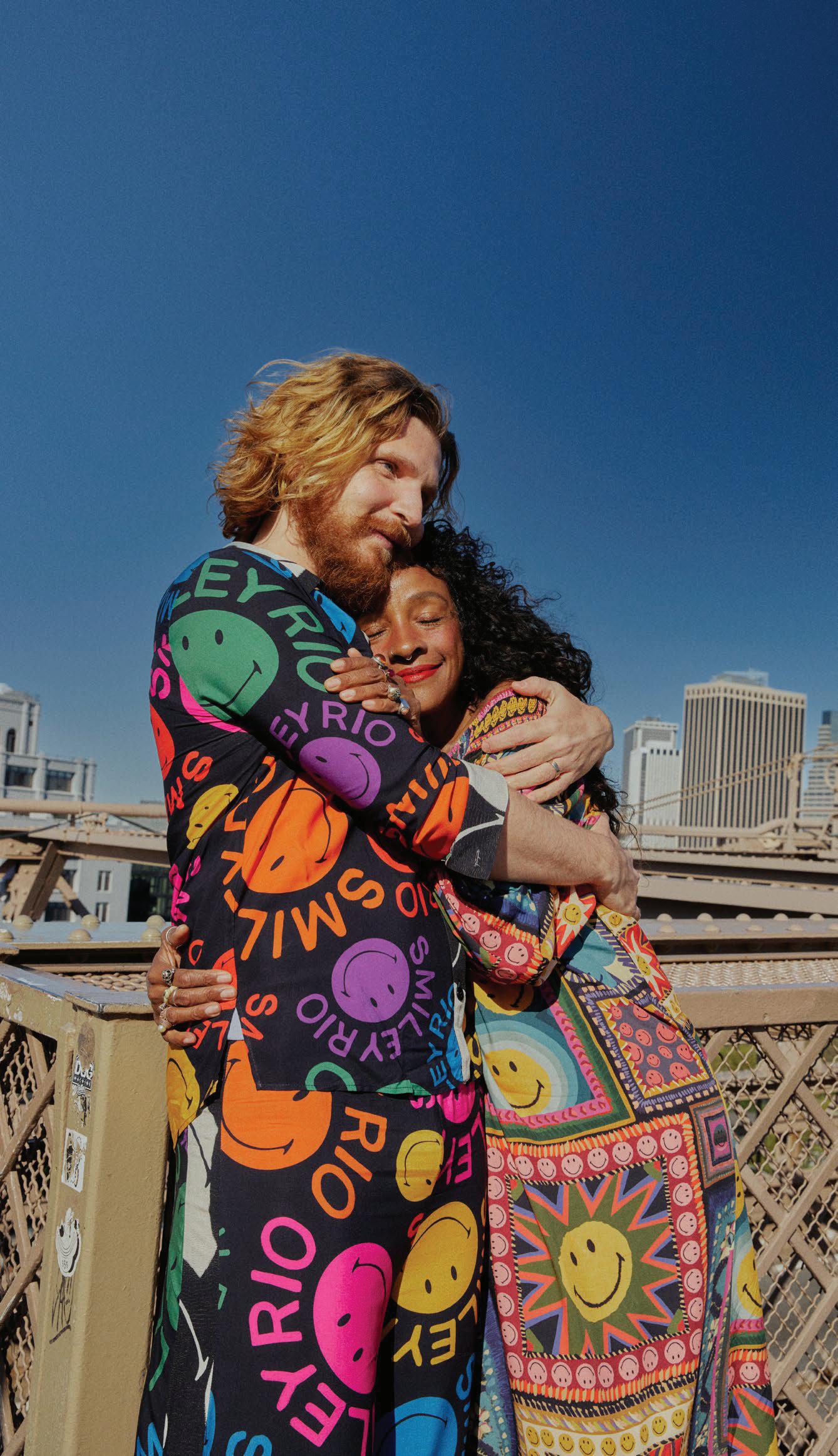
GROUNDED OPTIMISM; RECOGNISING THE CHALLENGES AHEAD, BUILDING A POSITIVE AND OPTIMISTIC BRAND ECOSYSTEM FOR CHANGE.

CHAMPIONING A MORE SUSTAINABLE LIFESTYLE THROUGH ‘FUTURE POSITIVE ®’
A
SMILEY.COM 210x297.indd 1 05/09/2022 15:57
MEET THE TEAM
Robert Hutchins Editor
WELCOME
The Products of Change ‘follow up album’ (as it has come to be known around here) has finally dropped. And it does feel like an evolution at work.
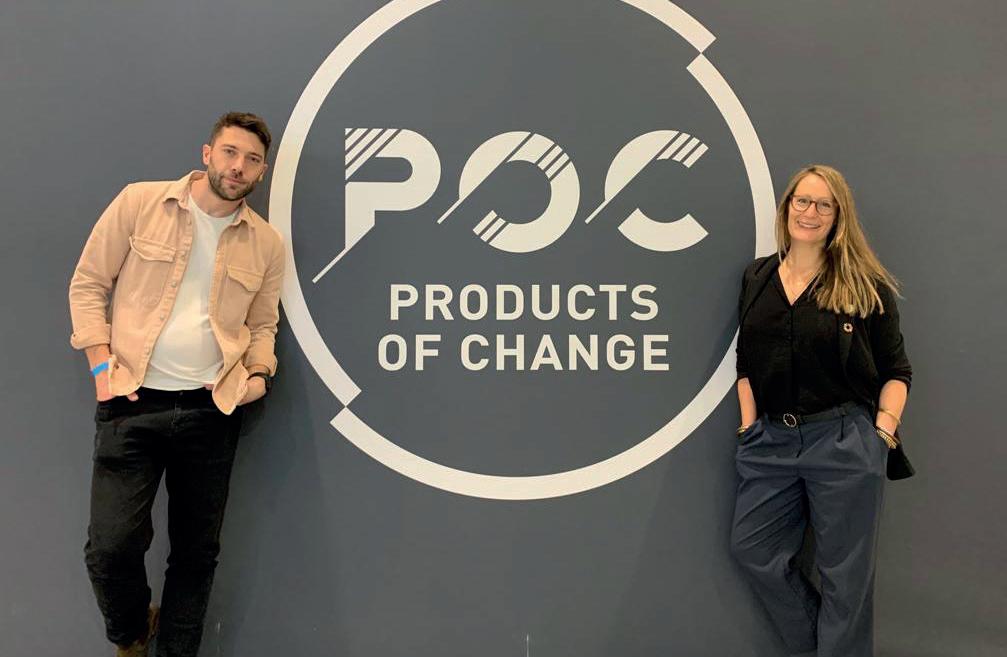
Just two issues in and the Autumn Sustainability Edit is another snapshot of industry development in action. And it’s amazing how far that has come.
Conversations have deepened, knowledge, understanding, and activity has all progressed, and the positive impact that businesses like yours are having is beginning to be measured.
The matter that our second issue lands to coincide with the long-awaited, in-person debut of the Sustainability in Licensing Conference this month makes it even more beautiful. This is an industry that doesn’t sit still, and with sustainable development the catalyst in all our converters, well – it’s an
encouraging indication of just how much we can achieve.
We said, in our last issue, that the journey ahead is long. And while that may still be true, the ground we have covered in a short amount of time is incredible. It’s why we couldn’t be prouder – or more excited – to welcome the industry to celebrate these achievements so far at the Sustainability in Licensing Conference this year.

Whether you’re on stage in London, in the audience, watching the live-stream from home, or catching up with the On Demand content at your leisure, you are all a major part of the consumer product industry’s fascinating and thrilling journey towards a positive and regenerative future. That’s a good reason to celebrate.
Rob Hutchins - editor & community manager


 Helena Mansell-Stopher - founder
Helena Mansell-Stopher - founder

 Helena MansellStopher Chief Executive Officer Rob Willis Director Ian Hyder Director
Jakki Brown Director
Helena MansellStopher Chief Executive Officer Rob Willis Director Ian Hyder Director
Jakki Brown Director
WELCOME PRODUCTS OF CHANGE I AUTUMN EDITION 2022 03
& ceo Products Of Change Media Ltd United House North Road London, N7 9DP For general enquiries contact: helena@productsofchange.com For press enquiries please contact the editor: rob@productsofchange.com For advertising enquiries please contact: ianh@max-publishing.co.uk robw@max-publishing.co.uk DRIVING SUSTAINABLE AND POSITIVE CHANGE ACROSS THE INDUSTRY Copyright© 2022. While every effort has been made to ensure the information in this magazine was correct at the time of publication, the publishers cannot accept legal liability for any errors or omissions, nor can they accept responsibility for the standing of advertisers nor any organisation mentioned in the text. Views of contributors do not necessarily reflect those of the publishers. Company Number: 12564033 ICO Registration: ZA777043
This magazine has been created using fully recycled, FSC certified material, printed with vegetable ink and traditional saddle stitch techniques. We encourage you to share your copy and while we hope it stays on your shelf for a very long time, you can recycle it when you’re ready.

07 NEWS
The latest in sustainable development from across the consumer products sectors.
14 THE BIG INTERVIEW
How the United Nations’ Media Compact is helping the stars align with the 17 SDGs.

16 RETAIL FEATURE
Clothing Regeneration Z: Primark gives us the run down on its sustainability strategy, Primark Cares and its major plans for regenerative cotton farming across the supply chain.
18 SUSTAINABILITY IN LICENSING CONFERENCE
Putting sustainability on your agenda, this is your guide to the day’s schedule when SiLC makes its in-person debut at the Royal Geographical Society, in London.
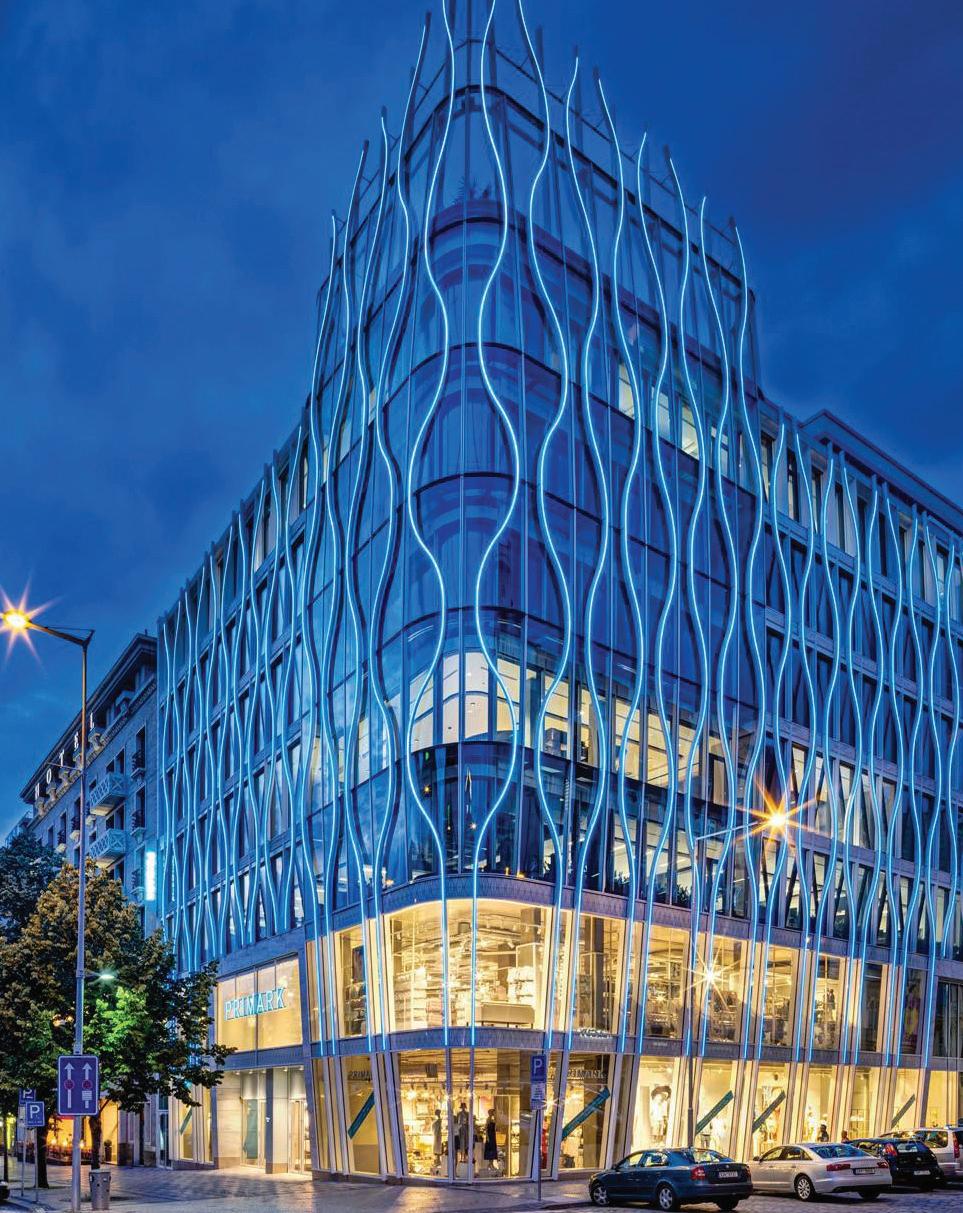
23 MEMBER NEWS
The latest news and sustainable developments from across the Products of Change members community.
27 INNOVATION SPOTLIGHT
The Cleaner Seas Group has been busy innovating a solution to the some 1.4 million trillion microfibres leached into the oceans each year. Discover more here.

28 THE FEATURE INTERVIEW: LEGO
The LEGO Group is in the mood for sharing. Follow its journey and best practice as the toy maker continues its journey to carbon zero, single-use plastic free.


33 INDUSTRY THOUGHTS
Thinking gives us room to get creative and innovate, and we welcome thoughts on sustainable development from all corners of the industry. We round up just a few from our POC Ambassador network and beyond.

CONTENTS
07 23 28 CONTENTS 14 16 27 PRODUCTS OF CHANGE I AUTUMN EDITION 2022 05
WE DESIGN THE SOLUTIONS THAT MAKE FAMILY BRANDS STRONGER


Sustainability is one of our Six Immovable Pillars of Childhood. We chose it because children will be making the big decisions about our planet in just a few years time.
So let’s inspire them by what we do and what we make.
Products of Change enables us all to do what is necessary and we’re super proud to support the important and tireless work Helena, Rob and the team do.

Team KI

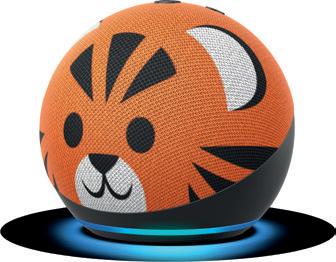
KIDSINDUSTRIES.COM INSIGHT | STRATEGY | CREATIVE 20
Danilo has received funding through the Eastern New Energy Grant Programme to install solar panels at its offices in Waltham Abbey from the start of 2023.
The calendars and greetings specialist has been a leader in industry conversation since embarking on its sustainability journey. Changes made to its operations already include LED lighting installation last year and EV charging points this spring.
“The success of our grant application means we can go ahead with works to install solar panels. We’re passionate about protecting the planet and we appreciate the impact our business can have on the environment. Therefore, we have put a strategy in place to focus on ways we can reduce that,” said Claire
Bates, marketing manager at Danilo.
“We’ve also started working with Climate Partner to calculate and verify our current carbon footprint. This work will help us set sustainability goals for the business to work towards.”
Seeing sustainability challenges “as opportunities to improve product,”
MICRO-PLASTICS MAKE BIG WAVES FOR AARDMAN AND CLEANER SEAS PROJECT AT LAND’S END
Aardman turned its popular Land’s End exhibition into an education on global plastic pollution this summer in partnership with the artist and cofounder of Cleaner Seas Project, Avril Greenaway.
The Cornish landmark and interactive family experience played host, this July, to a collection of artworks depicting Aardman characters made from micro-plastics found at the beach.
The pieces – showcased at the Aardman Presents: A Grand Experience tourist attraction - included the image of Shaun the Sheep surfing a wave of plastic, a friendly seal from Aardman’s Creature Comforts, and the Aardman logo. Each was made using shards of micro-plastics cleaned up from across Cornwall’s beaches.
Both primary micro-plastics (the raw material used to make plastic products) and secondary micro-plastics (large pieces that have been broken down by UV rays and the ocean’s waves) were used.
“Overlooking the wild and beautiful Atlantic Ocean, Land’s End is a fitting home for art that has such an important message about protecting our seas and beaches from pollution,” said Avril.
Molly Van Den Brink, attractions and live experiences manager at Aardman, added: “We’re thrilled to support the work Cleaner Seas is doing to raise awareness of the crisis we face in ocean plastic pollution.
“Avril’s artwork made entirely from microplastics found on the beach highlights wonderfully the cause, made particularly poignant by the proximity of the gallery to the Atlantic.”

KEEPING YOU UP TO DATE WITH THE LATEST STORIES
Danilo has added new, clear recycling labels to its products and made its desk easel and desk block calendar range completely plastic free and recyclable.
“We’re putting reuse, as well as recycling, at the forefront when it comes to product design,” said Claire. “We’ve doubled the number of plastic-free wall calendars in our portfolio this year and continue our search for cost-efficient ways to reduce cello wrapping further.”
The team remains an active member of Products of Change and the GCA where discussions on reducing the impact of the greetings industry are ongoing.
“With sustainability high on our agenda, we’re excited to see new ideas developed and implemented for further sustainable practices in the near future,” said Claire.
BRAND LICENSING INDUSTRY CRITICAL TO ACHIEVING THE 17 SDGS, SAYS THE UNITED NATIONS
Representatives from the United Nations have said the brand licensing and consumer products industries will have a critical role to play if we are to achieve the 17 Sustainable Development Goals by 2030.

During a keynote address delivered by Caroline Petit, the deputy director from the United Nations Regional Information Centre on Brand Licensing Europe’s Day of Purpose this year, attention was turned to the further action the sector can take to drive positive, societal change.

This includes using sustainability to unlock creativity and innovation in the fashion space, as well as utilising brands to champion purpose, diversity, equity, and inclusion.
Having hosted its first Black Lives Matter catwalk event and entertained audiences with an exclusive Junk Kouture upcycled fashion parade, Brand Licensing Europe is on the path towards “changing the common narrative around trade shows.”
As a snapshot of an industry in transition, and through its partnership with Products of Change, it has been championed by the UN as “a summit where business leaders come to build a better future.” The task now is for the $300bn global licensing industry to push further.
“Governments have a strong responsibility to act, but industry and individuals can – and should – also be catalysts to transform the way products are manufactured, produced, distributed, and consumed,” said the UN’s Caroline.
“There are many ways in which the licensing industry can engage with the United Nations and a number have already joined the UN Global Compact, the SDG Media Compact, or the SDG Publishing Compact, while the likes of Mattel, LEGO, Swarovski, the Smurfs, Sony, and others are committed to removing harmful stereotypes on gender in their programmes, or generate quality educational programmes for books, toys, or television shows.
“But more is needed to reach the Sustainable Development Goals by 2030 and the brand licensing and consumer products industry is critical in accelerating that movement.”
PRODUCTS OF CHANGE I AUTUMN EDITION 2022 07
INDUSTRY NEWS
THE SUN RISES ON RENEWABLE ENERGY AT DANILO
Bringing sustainability to the table


We’re always striving to know better and do better, for people and for planet. Committed to finding sustainable solutions for kitchen and tablewares. Read our impact report, scan the code. puretabletop.com puretabletop pure_tabletop
JCB BUILDS SUSTAINABLE PACKAGING GUIDE FOR PARTNERS
JCB has developed its own Consumer Products Sustainable Packaging Guide to help licensing partners review their packaging solutions and improve their sustainability.

The guide is part of current efforts to bring the team’s consumer products division into full alignment with the values of the wider JCB business.
The brand has made big changes to its core construction business since 2010, working to reduce the carbon impact of its machinery through efficiency. JCB machines now use 50% less fuel while all its suppliers are required to join its Supplier Code of Conduct.
It’s become the focus of JCB’s brand licensing manager, Katie Lane to work with licensees to incorporate these same values into its consumer products business. Inspired by packaging guides from The LEGO Group and Tesco, JCB has utilised its engineering expertise to model the guide on the one it implements across its supply chain.
“The guide identifies three key priorities,” said Katie. “First is to optimise design and design packaging thoughtfully to ensure every element is necessary. Second is to source sustainably and maximise recycled and responsibly sourced content. Third is to support recycling and prioritise the circular economy, planning for the full lifecycle of the packaging.”
The Sustainable Packaging Guide is now being shared with licensees as JCB works alongside them to identify the areas of priority.
“We encourage communication. The guide includes useful resources and asks licensees to share learnings with us and each other so we can make progress quicker,” said Katie.
“Brands are realising their power of influence in sustainability. Some of our licensees are doing great things in terms of sustainable products, and there’s plenty more to come.”
UP, UPCYCLE, AND AWAY AS GEMAR EXPLORES BALLOON SECOND LIFE
Gemar is exploring ways to extend the life of its natural rubber latex balloons among consumers via a dedicated online platform called Second Life.
Working with its Gemar Masters, the Italian balloon specialist has created a video series to inspire customers to use their discarded or broken balloons to create new products. The tutorials are pitched at everyone, meaning balloon skills are not required by users, just “creativity and imagination.”

The platform is just a small part of the company’s developing sustainability strategy. In 2018, Gemar committed to the UN Global Compact to incorporate the 17 SDGs into its core business.
“Our responsibility programme has been restructured to implement these principles in our dayto-day operations, and we report these efforts each year through a sustainability report,” said Gloria Veta, brand and sales director at Gemar Balloons.
TALKING TABLES PARTIES FOR TOMORROW WITH B CORP STATUS
Talking Tables has been awarded B Corp status, making it one of the first in the partyware sector to join a growing list of businesses to pursue purpose as well as profit.
The company was required to meet B Lab’s rigorous social and environmental standards through an impact assessment covering governance, employees, communities, and the environment.
Applicants must meet a score of over 80. Talking Tables achieved 87.5, joining the likes of Innocent and The Body Shop in reaching B Corp status. Responsible for the world’s first plastic-free and recyclable paper cup, Talking Tables is currently working with Ecologi to offset its napkin and games production. The team is also committed to diversity with a zero gender pay gap.
“We’re honoured to be an early receiver of the certification within our industry,” said Claire Harris, Talking Tables’ founder. “The process has provided us a framework and its emphasis on continued improvement inspires us to develop new initiatives.”
PURE TABLE TOP ON A MISSION TO ‘END FAST FASHION IN HOMEWARES MARKET’
Pure Table Top has launched its own brand identity – Purer Home – to house projects and initiatives that imbue its ambitions to ‘end fast fashion in the housewares market’ and prove sustainability brings commercial gain.

These projects will contribute to a more transparent, accountable, and responsible supply and value chain by boasting their own ‘unique sustainability selling point’, from increased durability and recycled content to renewable energy use or reduced water wastage in production.
“We’re experts in what we do. As a result, we’re looking to develop standards and ways of working that don’t currently exist,” said Pure Table Top’s sustainability officer, Tom Sellicks. “We want to use our brand to raise awareness of the problem of fast fashion in homewares while rewarding suppliers doing good things to reduce their impact on the environment.”
Purer Home has even begun to introduce small-scale circular projects. For example, its ceramic office samples (which contribute over 107 tonnes of CO2e per year) are either collected and crushed on-site to be used as hardcore or sold at sample sales with all proceeds going to its chosen charity, Alex’s Wish. Purer Home hopes to work with retail partners in the coming months to introduce new return schemes to reuse, repurpose, or recycle any returned items.
“Deep down, we know that to reach our Net Zero target by 2040 we need to reduce the amount we are manufacturing,” said Tom. “So, circularity won’t just become a core arm of the business – it will be the business. It’s a long way off, but we’re ambitious.”
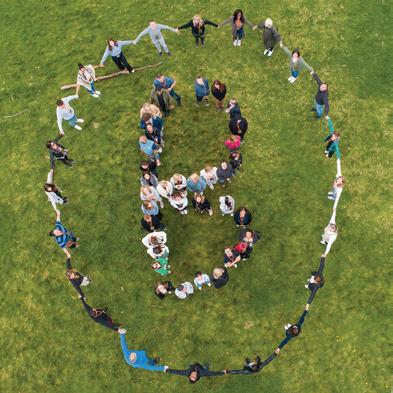
PRODUCTS OF CHANGE I AUTUMN EDITION 2022 09 INDUSTRY NEWS
ENVIRONMENTALLY FOCUSED

CAROUSEL CALENDARS HAS SIGNED



SCIENCE BASED TARGETS INITIATIVE

The initiative provides companies with a clearly defined pathway
how much and how quickly they need to reduce their greenhouse gas


in the context of their longer-term business growth. Its aim is to champion fact-based target setting in the
to the low-carbon economy.
UP TO THE
specifying
emissions,
transition
OUR PUBLISHED COMMITMENT WITH SBTi FURTHER TO THIS WE ALSO AIM TO ENCOURAGE 50% OF OUR KEY PRODUCT SUPPLIERS TO SIGN UP TO SBTi BY 2025 CAROUSEL CALENDARS COMMITS TO REDUCING SCOPE 1 AND SCOPE 2 GHG EMISSIONS 46% BY 2030 FROM A 2019 BASE YEAR, AND TO MEASURE AND REDUCE ITS SCOPE 3 EMISSIONS. OUR COMMITMENT IS IN LINE WITH A 1.5-DEGREE PATHWAY. All companies that are signed up to SBTi have their targets published on the SBTi website: https://sciencebasedtargets.org/companies-taking-action/ Targets adopted by companies to reduce greenhouse gas (GHG) emissions are considered “science based” if they are in line with what is required to keep global temperature increase below 2 degrees Celsius, and pursuing efforts to limit warming to 1.5 degrees, compared to preindustrial temperatures. WHAT ARE SCIENCE BASED TARGETS? Carousel Calendars - a Zebra MTD Ltd company +44 (0)1392 826482 HELLO@CAROUSELCALENDARS.CO.UK WWW.CAROUSELCALENDARS.CO.UK
SMILEY SETS AMBITIOUS PARTNER TARGETS THROUGH FUTURE POSITIVE
The fashion icon and lifestyle brand, Smiley has set targets to ‘transform its business’ over the next five years with a goal to bring 100% of its licensing partners into alignment with its Future Positive trademark by 2026.

As an IP company, Smiley is currently working with its partners to encourage best practices within the supply chain, providing creative design inspiration across the categories that includes
sustainable design, material recommendations, and industry insight.
Future Positive is Smiley’s long-term sustainability strategy as the firm “progresses a business model that encompasses the UN’s 17 SDGs”. Its efforts focus primarily on responsible consumption and production to increase resource efficiency, embrace the circular economy, and promote sustainable lifestyles.
Within the next five years, Smiley aims for 50% of Smiley Products to adhere to its sustainable criteria while 100% of its licensees signed by 2026 will make products in alignment with its Future Positive trademark.
The company also aims to see 100% of its Smiley Originals and SmileyWorld packaging, POS, and brand marketing assets made from recycled and recyclable materials.
“Future Positive is about taking action, not just talking about it,” said Charlotte Rakowski, vp of sustainability at Smiley.
“We do, however, recognise that sustainability is a journey and we welcome the opportunity to work with brands at the beginning of their journey to brands that are further advanced, as long as we are aligned with core values and views on sustainability.”
TEEMILL JOINS FORCES WITH SHOPIFY TO DRIVE CIRCULAR
The sustainable print-on-demand specialist, Teemill is joining forces with the all-in-one commerce platform Shopify to bring circular fashion to customers around the world.
The partnership will not only streamline processes for Shopify customers to source, print, and store their products before shipping them, but drive Teemill’s mission to bring circular principles to the mainstream through its Remill technology.
The Teemill Shopify app will handle the entire supply chain process while using only organic materials that can be sent back when worn out to be made into new products.
“The idea behind Teemill has always been a simple one – to end waste and give as many people as possible the opportunity to play their part,” said Tobias Penner, chief operating officer at Teemill.
“Ecommerce platforms like Teemill and Shopify are transforming the landscape of fashion. By giving anyone the power to create the sustainable and circular products they want to see on the market, you start to fundamentally challenge the traditional fashion industry.”
Teemill has more than 10,000 stores using its technology, including Greenpeace, WWF, and BBC Earth. Its Remill technology has helped divert 30,000kg or organic cotton from landfill, avoiding 1 million kg of CO2e emissions to date.

The team’s goal is to take 100 million items “back around the loop” by 2027. Scaling the business through its partnerships will play a key role in achieving this goal, which is why Teemill has also recently launched its first APIs, allowing anyone to connect any online platform to its supply chain.
“Anyone will be able to use it to create new products, leaner and more efficient ways of operating, and jump ahead on the circular economy,” said Tobias.
UNTAGGED GAMIFIES SECOND-HAND SHOPPING FOR GEN Z
Untagged is helping fashion-conscious shoppers level up their wardrobes by gamifying resale through its interactive second hand ‘shwopping’ app.

The app experience challenges users to complete missions and trade clothes to earn Untagged’s in-game currency, TT. This TT can be used to purchase second hand clothing from other users in a cashless shopping system.
The only money spent is that for postage and packaging.
The platform is the brainchild of Untagged ceo and founder, Gayle Harrison who spotted the rise in demand for pre-loved among Generation Z but was aware than many are still put off by “boring, time-consuming, transactional” systems.
“We want to change this by making it fun and rewarding,” said Gayle. “Untagged has gamified the experience in a similar way to how Duolingo has gamified learning a foreign language: you still have to do the work, but at least we can make it fun for you to do it.”
Gayle and Untagged are now challenging big, high street brands to get on board with the app and its aim to perpetuate the circular economy for fashion.
“We need high street brands to change their supply chains to embrace more circular business models and new, sustainable fabrics. Things are happening, but not quickly enough,” Gayle said. “In the UK alone, there is £30bn worth of unworn clothing sitting in our wardrobes. Untagged is committed to making real change in this fastmoving space to help make fashion more sustainable, and healthier on the pockets.”
SMALL WORLD ACCESSORIES EYES BIG PLANS FOR CARBON REDUCTION
Reducing carbon emissions across its production and UK operations is the next hurdle on the sustainability trail for Small World Accessories, the team has told Products of Change.
The accessories specialist has already implemented vast new measures across its production systems over the past 12 months, introducing recycled materials into 73% of its product portfolio since February 2021, only narrowly missing its projected target of 80%.
With its AW 2022 ranges running at 79%, placing responsibly produced alternatives in the hands of its target audience, Small World Accessories is eyeing the next move along its journey towards reduced impact and improved sustainability.

Attention will now turn to improving its reporting and process implementation to reduce carbon emissions across its Tier 1 factories as well as its own UK operations.
“The proactive discussions we are having with our factories regarding carbon emission reduction processes is really exciting,” said Dominic Galvin, managing director of Small World Accessories. “We know this will take time but when the momentum kicks in then we will start to see positive results.
“As a business, we are excited about having these discussions rather than passively waiting for others.”
PRODUCTS OF CHANGE I AUTUMN EDITION 2022 11
FASHION & RETAIL NEWS


# EU Beach Cleanup

BELOW: Raya, created by Sesame Workshop for the Cleaner, Healthier, Happier campaign that runs in Bangladesh, India, and Nigeria and is funded by the Bill & Melinda Gates Foundation.

THE STARSTHE STARS,
The thing with Caroline Petit, the deputy director of the United Nations’ Regional Information Centre for Western Europe, is that she likes to popup where she’s least expected. In a professional capacity, of course.
This doesn’t mean she’s accustomed to lurking around corners, waiting to catch you drinking from a plastic straw – no matter how good that account would be on TikTok – but it does mean that visitors of Brand Licensing Europe this year found themselves – unwittingly or not – witness to a UN address on sustainability in brands and fashion.
It was on stage that Caroline introduced audiences to the Irish educational youth movement, Junk Kouture – the ‘circular pioneers of tomorrow’ – while it was on the show floor at the ExCeL London event that the United Nations’ representative learned the most.
“I learned a lot at Brand Licensing Europe,” she tells Products of Change now from the comfort of her own home in Brussels. “I like to be, as a UN Communicator, in places where the UN is not expected to be because that’s where we can meet new audiences, communicate, and also learn about industry priorities and where the matches are with the 17 Sustainable Development Goals.
“And I met with some really committed and innovative industry professionals at Brand Licensing Europe, like The Eden Project and Wastebuster; those companies are really doing it, taking action, and inspiring people.”
It works as a reassurance of sorts, Caroline admits, that industry is starting to make a difference and that behind the big brands and the corporate logos, there are “human beings who are committed and realise that yes, we need government, but that it is essential we act at all levels to take responsibility, too.”
For Caroline, her role is all about raising awareness. Awareness and education. It’s how the United Nations and its network of 59 United Nations Information Centres across the world, acting on behalf of the Department of Global Communications of the United Nations, see it best to “mobilise action for the planet”.
This all falls, by the way, under the communication priorities and UN Pillars of the UN’s Secretary General, Antonio Guterres; to embed Peace and Security, Human Rights, and Sustainable Development across the world.
“We are in emergency mode,”
BIG FEATURE: THE UNITED NATIONS 14 PRODUCTS OF CHANGE I AUTUMN EDITION 2022
The United Nations’ SDG Media Compact has a mission to educate and raise awareness through stories and entertainment. And that’s the licensing industry’s bread and butter. Caroline Petit, deputy director of the UN’s Regional Information Centre, shares her mission.
says Caroline. “We are mobilising for the planet –taking care of the planet of the people, fighting inequalities, all while recovering from Covid-19. Which is why we are trying to recover better – and greener – and leaving no one behind.”
Much of the effort is exerted in battling the rise in misinformation, hate speech, and all the other - darker – areas of social media that “do nothing but hinder that progress.”
“The spread of misinformation and doubting, it’s led to a lot of things that have been misunderstood or misinterpreted,” Caroline explains. “The 17 SDGs were adopted by the UN in 2015 and we are halfway towards the deadline of 2030 and a lot of progress has been made. But misinformation has become a barrier to breakdown.
“Just like there are still people who didn’t get the Covid-19 vaccine, the same is for climate change. There are still people who do not believe what the science is telling us.”
It strikes a particular chord for the Belgian whose own country suffered flooding in the last year owing to climate change. Then there are the events in Florida and the heatwaves and fires here in the UK.
“Misinformation is a vicious circle, and our mission is to stop that and tell audiences to pause and think,” says Caroline. “We want to educate people, because if we don’t, we will lose that focus of energy on the 17 SDGs and the mobilisation of action.”
This is where the industry comes into its own. Caroline makes no secret that the brand licensing sector will have a key role “towards achieving the 17 SDGs because they can be a catalyst of change.” Many of them already are.
These are companies positioned to talk to manufacturers, distributors, and producers while delivering to a wide, global audience whose own awareness of the connection between people and the planet is growing.
Caroline uses The Smurfs as her prime example, largely because the brand – like herself – is Belgian, but equally because it is one of the many her office is proud
by both the UN and the EU. Since then, the brand has been working in closer and closer alignment with the SDGs in a bid to facilitate global changes.
You may have noticed, for instance, Smurfette no longer plays nurse to the Smurf Village. That was part of the “constructive criticism” offered to the brand upon its signing to the SDG Media Compact.
“I see the SDG Media Compact not just as a signature and a ‘hey guys, I’m part of the SDG Media Compact,’ but as an opportunity to have a point of contact in the UN who would help you to see what matches and where your own priorities line-up with the SDGs,” says Caroline.
“I like to always say, the goals are not the UN Goals – they have been adopted by the UN, but they are the People’s Goals. They are yours, and mine, and the industry, because if we are empowered then we can embed them in whatever we do.”
Caroline can’t not mention the LEGO Group, either, which has been a long-term partner of the United Nations and has been the source of some very interesting discussion around creating products aligned with the values and ways in which to integrate those values into the daily life – and the toys – of children.
LEFT: Rovio’s Angry Birds joins the UN’s Act Now Climate Campaign in 2019.

LEFT: Mattel’s Thomas the Tank Engine gets all aboard with the UN’s 17 Sustainable Development Goals.

to have recruited to the SDG Media Compact. Representative of the value of friendship, their connection to nature, and the colour blue – “the United Nations’ blue” - Caroline saw that the spirit of The Smurfs aligned, somehow, with the SDGs.
“We just needed to align the brand closer,” Caroline remembers. “So, by signing up to the SDG Media Compact, a group similar to our UN Global Compact but a network of media and entertainment brands and networks aligned with the 17 SDGs, we created a dialogue to bring them in closer with our kind of missions and aspirations.”
One of the first campaigns The Smurfs embarked on as ambassadors for the United Nations’ SDGs was a European Beach Clean-up orchestrated
“I really believe the industry is key because education is key and can solve so many SDGs,” she says. “And so is collaboration. Working together is a big part of the journey towards
BELOW: Products of Change’s Helena Mansell-Stopher and the deputy director at the United Nations Regional Information

BIG FEATURE: THE UNITED NATIONS PRODUCTS OF CHANGE I AUTUMN EDITION 2022 15
“I really believe the industry is key because education is key and can solve so many SDGs.
Working together is a big part of the journey towards success.” Caroline Petit, The UN
CLOTHING REGENERATION Z
Primark Cares is on a mission to transition the high street retailer’s relationship with fashion, from materials and supply chains to the repair and reuse economy of tomorrow. Products of Change catches up with director Lynne Walker to talk affordable sustainability
TOP: Primark launched its Primark Sustainable Cotton Programme in 2012 and is now the largest of its kind in the fashion sector.

RIGHT: Lynne Walker, director at Primark Cares will be talking at SILC 2022.

Primark Cares is a fantastic initiative to make sustainability accessible and affordable. Can you give us an overview of how you are doing this?

Primark has been working hard to become a more sustainable business for over a decade but our Primark Cares strategy – launched last year – accelerated this. We’ve set ourselves ambitious commitments to change our business model, including the way we make and source our products.
Primark Cares is our commitment to doing better, every day – making more sustainable products that everyone can afford, reducing our impact on the planet, and supporting the people who make our clothes.
By 2030, 100% of our clothes will be made using recycled or more sustainably sourced materials. We’re working to become a more circular business to ensure everything will be recyclable by design and focus on strengthening the durability of our clothes.
Ultimately, we believe more sustainable fashion shouldn’t come with a higher price tag, and we have the scale to apply this across everything we do.
What have been some of the biggest wins or greatest impact areas that Primark Cares has seen so far?
Well, already today almost 40% of all the clothes we sell are made from recycled or more sustainably sourced materials under the Primark Cares label, while our Primark Sustainable Cotton Programme, which we started nine years ago, is now the biggest of its kind in the fashion industry. As part of this, we have committed to train 275,000 farmers in the programme by 2023.
We have removed over half a billion single use plastics from our business and have built a team of 130 experts worldwide based in each of our key sourcing markets who inspect every tier one supplier factory in the Primark supply chain at least once a year unannounced. This occurs more frequently in some countries, including China.
We want our customers to make informed decisions and trust the claims we make about our products. We feed into the CMA’s Green Claims guidelines through the British Retail Consortium, so any claims we make around our Primark Cares products are transparent and meet regulatory requirements. We welcome the CMA’s work to ensure that sustainability claims across the industry are rigorous and informative for customers.
We know we need to change – not only do our customers expect it, but we have a responsibility to drive more sustainable behaviours within our business and supply chain. We will transparently report on our progress against our commitments annually, starting in November, and will continue to push ourselves to go further and be open about the challenges we face.
Primark Cares’ Commitments – giving clothes a longer life, protecting life on the planet, improving people’s lives – speak a lot to the principles of circularity such as designing out waste and regenerative business practice. What do these developments look like in day-to-day practice?
Recyclable by design means that our designers and buying teams are starting to design clothes with the end in mind. This means making different decisions at the outset around fabric composition, and what embellishments or components can be used to ensure a garment can be easily recyclable.
This can mean moving towards a single sustainable mono-material for each garment; minimising the use of blends of natural and synthetic fibres, minimising the use of embellishments such as beads and
16 PRODUCTS OF CHANGE I AUTUMN EDITION 2022
Q&A: PRIMARK CARES
sequins, ensuring labels or logos are easily removable, designing jeans with removable buttons, or replacing metal rivets with stitches.
Our designers, buyers, and suppliers need to work within the boundaries of current recycling abilities, so we train them to know what design modifications they need to make to help close the loop and move towards better recyclability. We’ve appointed a Circular Product Lead to manage this work internally and a circular design pilot has been completed with our denim and jersey buying teams and suppliers. We are now building the training content to start scaling this by Q4.
Over time, we hope to move to a closed loop system, recycling old clothes and not plastic bottles, allowing us to increase our use of recycled materials. However, the technology to do this is still in its infancy. This can’t happen overnight, but as the industry evolves and innovation scales, we will evolve with it.
Can you tell us about your Sustainable Cotton Programme and the plans to use more regenerative agricultural practices by 2030? What does this involve, in terms of education for farmers, techniques, and assessing the supply chain?
We developed the Primark Sustainable Cotton Programme and launched the first pilot in India in 2013 in collaboration with agronomic experts, Cotton Connect, and the grassroots organisation, the SelfEmployed Women’s Association, with the aim of reducing its impact on the environment, changing the way the business sources its cotton and improving the livelihoods of farmers.
Since then, the programme has expanded to Pakistan and Bangladesh with the expertise of local market partners, and has already trained almost 150,000 smallholder farmers, 80% of whom are women. Earlier this year we announced a major expansion of the programme, committing to train 275,000 cotton farmers in more sustainable farming by 2023, an expansion of over 80%.
Primark’s sustainable cotton is grown through a unique process using CottonConnect’s REEL (responsible environment enhanced livelihoods) Programme. Cotton farmers are trained over three years to address an over dependence on chemical fertilisers and pesticides to preserve the biodiversity and help mitigate against climate change. The programme gives back to local farming communities.
On average, farmers in the programme use 40% less chemical pesticides and fertilisers and 10% less water used by acre, with a 14% increase in yield and growth in profits by 200%. Moving forward, the programme will be focused on restoring biodiversity, committing to adopt more regenerative practices by 2030.
What is Primark doing to slow fashion down through repair, upcycling, second-hand purchasing, and the extended life of products?
What potential is there for you here?
We’re proud of the quality of the clothes we sell, and we work hard to ensure our customers can wear our clothes time and again. Our commitment is focusing on how we can make them last even longer.
There is currently no industry standard for measuring the durability of clothes. We’ve been reviewing our current testing requirements using the WRAP Longevity Protocol (2013) to inform us of the additional number of washes our clothing needs to meet the guidelines.
Each category will have a different number of washes depending on product type and end use.
Starting with denim, all our denim clothing will be washed to the new requirement of 30 washes. This is in line with EMF Jeans redesign and WRAP. We continue to work with suppliers to support improvements on products that don’t meet our durability requirements – for example the use of better dyes or adjustments to fabrics to strengthen them.
We are also working with WRAP and are a signatory to Textiles 2030 – the UK’s most ambitious voluntary agreement designed to limit the impact clothes have on climate change. We’re playing an active part in developing new industry guidelines on durability in WRAP’s clothing longevity protocol. We use this protocol as a guide to ensure that we can substantiate any claims by using the number of washes from the protocol as a benchmark.
We know there is a lot more work to do and strengthening the durability of our clothes will be a process of continuous improvement over time.
We have also launched a customer and colleague programme to show people some easy ways to repair their clothes so that clothing can remain in active use for longer. We have held 48 repair workshops in six cities, including our head office, educating over 470 colleagues and customers with new skills to repair their clothes. These will continue to be rolled out throughout the remainder of this year and then in 2023 we plan to ramp it up further into other markets.
LEFT: Primark in Prague. The retailer is growing a global network of stores, including this stunning location in Prague.

BELOW: Primark Cares in Numbers details some of the staggering stats that the sustainability programme has achieved to date.

Q&A: PRIMARK CARES PRODUCTS OF CHANGE I AUTUMN EDITION 2022 17
SUSTAINABILITY IN LICENSING CONFERENCE 2022
It’s within the auditorium of the Royal Geographical Society in London that the industry will find itself this 18 October. A venue selected for its long history in progressing the advance of geographical discovery and exploration, and its dedication in more recent decades to the pursuit
9.15AM – OPENING STATEMENT
Helena Mansell-Stopher, ceo and founder of Products of Change will highlight how far the industry has progressed over the last two years before outlining the day’s conversations.
Helena Mansell Stopher, SiLC director and founder of Products of Change


9.50AM – THE INSIGHTS FAMILY PRESENTS THE LATEST SUSTAINABILITY DATA
With consumer mindsets shifting dramatically and the expansion of new digital revenue streams, Ivan Colecchia, svp international development at The Insights Family, will showcase the latest consumer data and sustainability trends from across the globe.
Ivan Colecchia, svp international development, The Insights Family
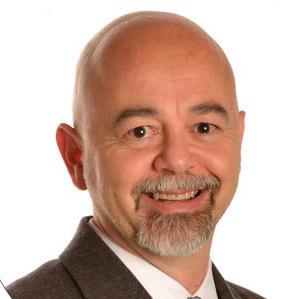
of climate change knowledge and action. What better place to host the very first, in-person Sustainability in Licensing Conference?
Here to facilitate positive and sustainable change across the consumer products space, this year’s SiLC promises to deliver inspirational speakers, panel
sessions featuring some of the most pioneering companies and individuals, and agenda-setting discussions all centred on the pursuit of better business. For people and the planet. Let’s take a look at what the Sustainability in Licensing Conference 2022 has in store.
9.30AM – BUSINESS WITH PROFIT AND PURPOSE: THE BALANCE OF A SUSTAINABLE BUSINESS
Alan Moore is an author and innovator; a designer who has worked with the likes of The Coca-Cola Company, a business craftsman who has sat in the boardrooms of some of the biggest Blue-Chip companies on the planet, and a writer who has penned some of the most pioneering thoughts on what modern economics could look like.
His books Do/Design and Do/ Build will form the subject matter of the keynote address he will be

delivering at this year’s conference, geared to inspire leaders to create a business the world needs – one that is regenerative, net positive, and ultimately beautiful.
Alan Moore, author and founder of Beautiful Business
10.10AM – HOW TO IMPLEMENT THE UNITED NATIONS’ 17 SUSTAINABLE DEVELOPMENT GOALS WITHIN BUSINESS

Lucie Brigham, chief of office of The United Nations Office for Partnerships, and Kerry Bannigan, executive director of the Fashion Impact Fund will deliver a SILC exclusive presentation on the Conscious Fashion and Lifestyle Network and the benefits of aligning with the 17 Sustainable Development Goals to highlight how, through their platform, the UN is bringing businesses together to drive awareness of its global framework.
Lucie Brigham, chief of office for The United Nations Office of Partnerships
Kerry Bannigan, executive director of the Fashion Impact Fund

Making its in-person debut at the Royal Geographical Society in central London, the Sustainability in Licensing Conference delivers a packed agenda of inspirational leaders, innovators, informative panel sessions, and ground-breaking updates.
CONFERENCE AGENDA
18 PRODUCTS OF CHANGE I AUTUMN EDITION 2022
10.25AM – THE IMPACT OF YOUR DIGITAL TWIN: HOW THE DIGITAL WORLD HAS A REAL WORLD IMPACT
The host of the Behind the Brands podcast and ceo of the Fashion Metaverse Club, Warren Parker-Mills will chair a panel session featuring speakers from Flowhaven and the carbon reduction specialist, The Carbon Farm to offer a closer look at the real-world impact of the development of Web 3.0, the Metaverse, and the digital space. How can it be used to influence change, and what’s it doing to reduce its own impact?
Warren Parker-Mills, host of Behind the Brands podcast

Timo Olkkola, founder at Flowhaven



Glyn Mitchell, soil carbon and soil health agronomist, The Carbon Farm
11.00AM – BREAK
11.25AM – IN THE LOOP WITH TEEMILL AND THE TECHNOLOGY BEHIND CIRCULAR FASHION
Teemill is on a mission to take 100 million items of clothing ‘back around the loop’ by 2027 using its circular clothing technology Remill. Mart DrakeKnight, founder of Teemill will talk audiences through the latest developments from the circular fashion specialist.
Mart Drake-Knight, founder of Teemill
11.45AM – THE CHANGING ECONOMIC LANDSCAPE OF RETAIL
Richard Lim, ceo of Retail Economics will talk us all through the latest market data, focusing on key retail, shipping, and sustainability themes, as well as the key trends for 2022. Richard will also share his future forecasting insight for the retail landscape.
Richard Lim, ceo, Retail Economics
12.10PM – THE FUTURE OF SUSTAINABLE CONSUMPTION AND WASTE WITHIN PRODUCTION
Join the George at ASDA team to learn about its latest initiatives to reduce the supermarket giant’s environmental impact, including the implementation of emerging 3D tech to reduce its material, energy, and production waste.
Jade Snart, senior sustainability business manager, George at ASDA
Jessica Brown, designer at George at ASDA
Helen Scobie, product development expert, George at ASDA
12.40PM – ENGAGING FOR CHANGE
As a global leader in retail pharmacy, Walgreens Boots Alliance touches millions of lives every day and is proud to be a force for good through contributions to healthy communities, a healthy planet, and a sustainable marketplace. Join WBA’s head of sustainability, Tanya Ashton to learn how the Alliance has been working to embed sustainability throughout its global sourcing organisation.
Tanya Ashton, head of sustainability, Walgreens Boots Alliance, Global Sourcing
1.00PM – LUNCH
2.00PM – GLOBAL FAST FASHION AND HOW THE INDUSTRY IS TRANSITIONING TO A SUSTAINABLE FUTURE
Global fashion retailer, Primark will present its sustainability framework and its journey with it to date, all documented through its Primark Cares initiative. Join Primark’s global licensing manager, Harris McQueen, and Primark Cares manager, Sarah Hawkins for a closer look at the retailer’s ongoing efforts.
Harris McQueen, global license manager (adults), Primark
Sarah Hawkins, manager, Primark Cares




2.25PM – SUSTAINABILITY AT RETAIL PANEL
Primark Cares’ Sarah Hawkins and Harris McQueen, George at ASDA’s head of sustainability Jade Snart, WBA’s Tanya Ashton, and Richard Lim, ceo of Retail Economics will answer your questions on sustainability at retail.
Harris McQueen, global license manager (adults), Primark



3.10PM – THE RISING CHALLENGE OF SUSTAINABILITY MESSAGING
More people want to buy green than ever before, and businesses are responding. But the increasing demand for greener products means businesses are using sustainability messaging as a marketing tool, making false or heightened statements to sell products. This is called greenwashing.
In this session, The Marketing Store’s head of global sustainability, Pamela Stathaki will talk us through what the Green Claims Code is, what new legislation is coming to support this, and how to avoid greenwashing.

Pamela Stathaki, head of global sustainability, The Marketing Store

PRODUCTS OF CHANGE I AUTUMN EDITION 2022 19
CONFERENCE AGENDA



SUSTAINABILITY IN LICENSING CONFERENCE 2022 CONTINUED...
3.35PM – MATERIALS IMPACT WITH TESCO
As the third largest retailer in Europe, there’s no doubt that Tesco impacts the environment. However, this grocery giant is setting aggressive targets to reduce this. Learn from Tesco’s senior packaging manager, Paul Earnshaw the great initiative the retail group is driving on the packaging side, and what it requires from suppliers, as well as its own action to meet both self-imposed targets and new government legislation.
Paul Earnshaw, senior packaging manager, Tesco CE

4.05PM – BREAK
4.30PM – BRANDS WITH PURPOSE –THE LEGO GROUP
The LEGO Group’s sustainability transformation director for licensing and extended lines, Sine Klitgaard Møller will discuss the role of brands with purpose today in driving the positive sustainable development of the next generation. We hear from the team how the LEGO Group is facilitating change through influence and inspiring others.
Sine Klitgaard Møller, sustainability transformation director, The LEGO Group
4.55PM – SUSTAINABILITY IN TOYS WITH MATTEL
The global toy giant, Mattel presents its sustainability journey so far, including the latest from its Mattel PlayBack initiative, as Mattel EMEA’s senior sustainability engineer, Elizabeth Eaves sets out the company’s ambitions for the future of play the world over.
Elizabeth Eaves, senior sustainability engineer at Mattel EMEA


5.20PM – PANEL SESSION: THE KIDS OF THE FUTURE
An expert panel hosted by Kids Industries’ founder, Gary Pope will take audience questions regarding the future of the children’s industry and how we, as a community, can be a driving force behind positive change. The panel will be joined by The Marketing Store’s Pamela Stathaki, the LEGO Group’s Sine Klitgaard Møller, Mattel’s Elizabeth Eaves, and the creator of Obki, the children’s climate change-focused animated TV series, Amanda Evans.
Gary Pope, founder, Kids Industries

Pamela Stathaki, head of global sustainability, The Marketing Store



Sine Klitgaard Møller, sustainability transformation director, The LEGO Group

Elizabeth Eaves, senior sustainability engineer, Mattel EMEA Amanda Evans, creator, Obki
6PM – AFTER CONFERENCE SOIREE
Your chance to network and discuss the day’s learnings within the grounds of the Royal Geographical Society here in Kensington, London. Take in the inspirational surrounding and a drink or two thanks to our generous after-show drinks sponsor, Brand Licensing Europe.


CONFERENCE AGENDA
PRODUCTS OF CHANGE I AUTUMN EDITION 2022 21


CLIMATE DICE ROLLS A SIX AT EDEN PROJECT
Climate Dice, the storytelling dice game that supports all 17 of the United Nations’ Sustainable Development Goals, has landed an extensive retail presence across all Eden Project gift shops.

A “milestone” moment for the manufacturer, Mind Your Footprint, the game is now enjoying exposure to the more than one million visitors Eden Project counts each year.
Developed by Pendar Vatanian, Climate Dice educates children about climate change through empowerment and storytelling. It aims to alleviate climate anxiety by allowing kids to envisage a better world.
Climate Dice had been building an audience through local Climate Emergency Centres such as Zero Carbon Guildford.
“Becoming an Eden Project supplier was like passing a milestone. Not only are they the symbol of sustainability but their supplier evaluation is the most comprehensive I have ever seen,” said Pendar.
“Getting an approval is like a verification of a sustainable business model, which to me is more valuable than selling dice to them. But their more than one million visitors a year certainly makes them an attractive partner.”
For every set of Climate Dice sold, Mind Your Footprint donates a set to schools in remote areas of the Global South. So far, Climate Dice has secured partners in Africa, India, Brazil, Peru and has seen a successful first batch land in Nigeria.
“We have seen how beautifully they are being used at local schools and community events to empower children,” said Pendar. “It’s better than we’d ever imagined.”
KEEPING MEMBERS UP TO DATE WITH THE LATEST NEWS
CAROUSEL CALENDARS GOES WILD IN ‘SECRET GARDEN’ PROJECT
Carousel Calendars is rolling up its sleeves for the environment with the launch of a new project to turn an abandoned wasteland at its Exeter offices into a haven for wildlife.
Not content with already aligning itself with the Science Based Targets initiative to put it on the 1.5ºC pathway, the calendar and greetings specialist has turned its attention to staff wellbeing, company culture, and environmental regeneration to transform its patch of forgotten land into a site for the local flora and fauna.
“The Staff-Wildlife Haven will become a paradise for our staff to immerse themselves in nature,” said Andy Ellis, facilities and health and safety manager at Carousel’s parent company, Zebra MTD. “Our vision is to have an easily accessible place –made by us – where diverse wildlife can thrive.”
The Haven will be divided into different areas, providing different types of habitat including dense native shrubland, a wild orchard, a naturally populated pond, a wildflower meadow, and an undulating scrubland, before joining a bridge over the stream that provides staff access to a woodland with seating areas.


With staff volunteering their time to the project, Phase One of the transformation is now complete, with paths laid, a bridge under construction, and the pond mapped out and dug.
“This is our secret garden,” said Andy. “We’re going to build a Buggingham Palace and get the kids involved in smaller parts of the project.
“At Carousel Calendars, Otterhouse, and Calendar Club we have set ourselves principles, and all those principles are around species preservation, using recyclable materials, and having a low carbon footprint. Our Staff-Wildlife Haven is about helping our staff engage with nature and appreciate the environment.”
THE RSPB NURTURES NATURE WITH PLAY PRESS TOYS
The UK’s wildlife conservation charity, the RSPB has teamed with Play Press Toys to develop and launch a new collection of wildlife themed construction sets that will educate children on the importance of protecting the environment.
The toy line – scheduled to launch in 2023 – will tap into the charity’s current Nature on Your Doorstep campaign and its aim to connect people to the wildlife around them. Sets in the range will focus on different habitats and share information on the species living there.
“We have been in discussions with Play Press Toys for a while now as we love their values of explorative, creative play, and saw real opportunity to engage children with nature,” said Louisa Skevington, product licensing manager at RSPB.

“Sustainability is a priority when taking on new partners and Play Press is an ideal one – the use of FSC paper and card, vegetable-based inks, and minimising air miles through UK production reflect the RSPB’s responsible sourcing strategy.”
The new range will complement Play Press Toys’ growing animal-themed collection of play-sets, with plans to showcase at
London’s Top Drawer and Spring Fair next year.
The RSPB has earmarked the toy market as an important channel for its licensing division, playing a key role in driving education of the natural world and the important work the charity does to protect it among younger audiences.
“Our licensing programme is a valuable means of generating awareness and funds for the RSPB,” said Louisa. “Royalties generated by sales are donated to RSPB Sales Ltd, which gives all its distributable profits through gift aid to the RSPB.
“In this way, our licensing campaign contributes to our work to protect habitats, save species, and help end the nature and climate emergency.”

PRODUCTS OF CHANGE I AUTUMN EDITION 2022 23 MEMBER NEWS
Your planet conscious creative partners. We use Planet Centric Design to overcome barriers to success, enabling you to grow, and communicate an honest message. Let’s make a positive impact on the world. Email info@nosy.agency Telephone +44 (0)1983 632997 Website nosy.agency View Showreel
RUBIES LAUNCHES RUBIES ZERO AS IT TARGETS CARBON NEUTRAL AMBITIONS
Rubies has launched a new initiative that aims to protect the environment through conscious products and drive its ambitions to be carbon neutral. Called Rubies Zero, the plan will help the dress-up and costumes expert evolve business “towards becoming fully climate conscious.”
“We firmly believe that being a hero is also preserving our planet,” said Rubies’ licensing manager EMEA, Aurélie Waklawski. “There is a real climate crisis and we all need to take responsibility to make a difference.
“As the world’s largest designer, distributor, and manufacturer of costumes and accessories, we need to lead the industry by example and use our position as a fancy-dress powerhouse for positive changes.”
Among the measures Rubies has taken to date is its Green Collection, a machine washable range of dress-up items featuring its biggest licences, all created using recycled plastic. The company is also promoting circular principles in its charity

partnerships to promote pre-loved and stock donation.
Rubies is also looking into launching take-back programmes with its retail partners in 2023.
“We are working on educating the business and further reducing our carbon footprint,” said Aurélie. “We have already started by opening a new design centre in the UK which will save samples being sent back and forth from Asia. We are also working on ways to reduce plastic and air packaging during shipment.
“We will carry on looking at ways to reduce the impact of costume manufacturing at the same time as growing our Green Collection,” she added.
DREAMTEX EARTH PAVES PATH FOR NET POSITIVE BUSINESS
Dreamtex has set its sights on Net Positive as it continues to drive sustainable change across the business through its Dreamtex Earth strategy.
Latest steps along the team’s sustainability journey include its work towards the ISO 140001 Environmental Management Certification and a full carbon footprint review across the business.
Under its Dreamtex Earth strategy, the character bedding specialist has extended its popular BCI-sourced collection with exclusive Bluey designs, as well as other key licences it plans to release next year.
PRODUCTS OF CHANGE SCORES US SPORTS AMBASSADOR TOUCHDOWN WITH NFLPA
The NFL Players Association (NFLPA) has set up its own Green Team to help drive the operation’s sustainability strategy; its first step towards implementing positive development across the company.
Its formation coincides with the appointment of The NFLPA’s president, Steven Scebelo, to the role of US Sports Ambassador for Products of Change. Steven will use the Association’s position of influence to encourage sustainable development within the US sports licensing sector.
It’s a similar role NFLPA sees itself playing to take sustainability to audiences across the world. The business wants to harness the power of sport and the reach of its athletes to act as ambassadors for sustainable development and environmental ambitions.
“Our players enjoy a position of influence. Pairing that with causes they have genuine affinity with is a great way to take this conversation far and wide,” said Steven.
“I’m pleased to join the POC community as US Sports Ambassador and look forward to helping drive sustainable development across the licensed sports consumer goods sector here in the US.
“Meanwhile, our Green Team will drive those efforts here at the NFLPA as we learn and develop along this journey together.”
The company has already taken steps to reduce its plastic packaging and introduce FSC cardboard.
Jo Duckworth, said: “We can’t wait to reveal our new sustainable lines for 2023. We have been working closely with retailers to develop a BCIsourced Bluey collection for Next and a range of coverless duvets with recycled filling for various brands.
“Sustainability is a key pillar in our company mission and we will continue to grow these lines going forward. We continue to challenge our sustainability strategy every day and are passionate about paving the way for sustainability in licensed home textiles.
“We will continue to work towards a greener future like many of our colleagues in the licensing industry are doing, too.“
COMPANY CULTURE RULES AT CREATIVE AGENCY NOSY
The creative agency, NOSY has introduced a new company discipline to only work with clients that positively impact the environment or are, at the very least, on their sustainable development journey.

Now positioned as an ‘ecoconscious agency’, and having spent nine months restructuring its portfolio, the Isle of Wight business has extended its sustainability strategy to encompass the clients it works with.
At the beginning of the year, NOSY joined the Green Impact Scheme and appointed its first virtual chief sustainability officer, James George, POC’s circular economy ambassador. Changes have also filtered down through the company culture and paid volunteer days have been added to all staff contracts.

“When it comes to ‘walking the walk’,
we aim to inspire the community and other businesses,” said Matt Greg, ceo and strategist at NOSY, pictured left.
“In 2022, NOSY organised four ‘Rubbish Networking’ events (litter picking around the Isle of Wight), became a Climate Friendly Workforce through Ecologi, sponsored a beehive at Banbury Bees, and signed up for the Cycle2Work scheme.
“All this came from the team because we encourage them to make decisions on how NOSY could become more sustainable. The hive-mind approach really matters.”
Last year saw NOSY establish 18 new client relationships, 14 of which with businesses that positively contribute towards the environment, from retro-fit and green non-profits, to solar farm development and wildlife conservation.
MEMBER NEWS
PRODUCTS OF CHANGE I AUTUMN EDITION 2022 25
INSET: The POC Sports Workstream meets with the NFLPA’s Steve Scebelo (pictured centre)
PARAMOUNT LAUNCHES SPONGEBOB SQUAREPANTS OPERATION SEA CHANGE TO TURN THE TIDE ON OCEAN PLASTICS
Paramount Consumer Products and Nickelodeon have launched SpongeBob SquarePants: Operation Sea Change, a new global ocean conservation and sustainability initiative that aims to remove and divert five million pounds of ocean plastic over the next four years.

The campaign will fund clean-up projects around the world through partnerships with several non-profit organisations, including Surfers Against Sewage, Plastic Oceans International, the Coral Restoration Foundation, and WORK.
At the same time, Paramount will work with current SpongeBob SquarePants consumer products partners to drive more sustainable practices and reduce single-use plastic in products. It will also curate partnerships with new brands to create innovative product lines.
Additionally, the initiative will engage millions of SpongeBob fans the world over with on-the-ground events and educational resources.
“With this initiative, not only are we funding change but reinventing how we do business by creating a connected global effort around sustainability, while also being afforded the opportunity to honour the legacy of the incomparable Stephen Hillenburg, marine biologist and SpongeBob SquarePants creator, who was so deeply committed to preserving our oceans and marine life,”
MATTEL TAKES GOLD AT PLAY FOR CHANGE AWARDS FOR MATCHBOX SUSTAINABILITY
Mattel took home the Gold Award in Sustainability at this year’s Play for Change Awards for its Matchbox ‘Drive Towards a Better Future’ campaign to engage kids in greener practices.
Created by Toy Industries of Europe, the Play for Change Awards aims to celebrate the toys and companies that are actively changing the face of play and helping children prepare for a positive future.
Mattel’s ‘Drive Towards a Better Future’ campaign impressed the Awards’ independent juries with its roadmap to make all Matchbox die-cast cars, play-sets, and packaging with 100% recycled, recyclable, or biobased plastic by 2030.
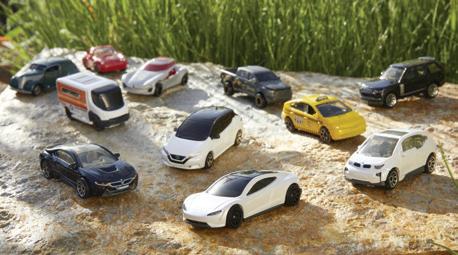
Last year, Mattel unveiled its Matchbox Tesla Roadster, its first die-cast vehicle to be made from 99% recycled materials, including zinc, steel, and plastic. The Tesla Roadster launched this year and has been certified carbon neutral.
Elizabeth Eaves, senior sustainability engineer at Mattel EMEA, was at the ceremony to collect the Gold Award in the Sustainability category.
“It’s an amazing feeling for the Matchbox Driving Towards a Better Future initiative to be recognised, as this is a project that brings together so many different aspects of Mattel’s sustainability journey and ambitions in one place,” she told Products of Change.
“We’re incredibly proud to have been honoured with this Gold Sustainability award by TIE, and this reinforces how important it is to keep working on projects like this that will have a big impact on our children’s future.”
said Veronica Hart, executive vice president, global franchise planning, Paramount Consumer Products.
New consumer products partners launching in support of the Operation Sea Change campaign this year and next, include AKUA and its kelp patty featured in reduced plastic packaging, Conscious Step which will launch branded apparel with a portion of proceeds donated to Oceana, a non-profit ocean conservation organisation, and Waterlust, a purpose-driven apparel company that uses clothing to educate, inspire, and support consumers in living more environmentally responsible lives.
Next year, SpongeBob SquarePants Operation Sea Change will expand to include new patnerships and products, additional short-form content to educate fans on the ocean plastic crisis, and on-the-ground cleanups and activations that will allow fans to get involved. working on ways to reduce plastic and air packaging during shipment.
“We will carry on looking at ways to reduce the impact of costume manufacturing at the same time as growing our Green Collection,” she added.
POC POWERS UP SUSTAINABILITY CRITERIA AT GOOD PLAY GUIDE
The independent children’s product review site, Dr Gummer’s Good Play Guide is bringing sustainability criteria into its fold with the help of the experts at Products of Change.
Toys featured in the Good Play Guide will have their sustainability criteria highlighted and will receive the opportunity to be showcased in a new feature on the POC website.

Brands submitting for review will be asked to verify relevant key environmental information around materials and packaging. The process will also consider an environmental cost per play. Environmental themes within the play patterns of a product will also be noted and will be the only criteria relevant to apps and video games.
There are currently four ‘Good Guides’ within the GoodPlayGuide.com - the Good Toy Guide, Good App Guide, Good Baby Guide and Good Learning Guide.
For physical products, features such as the returns and spare parts policy, reparability, and end-of-product lifecycle facilities will also be considered and reported within the reviews on the site. This will give consumers access to the information they are increasingly demanding to be able to make informed decisions.
Dr Amanda Gummer said: “While the sustainability criteria are not going to be formally assessed and won’t cause a product to fail a GPG review, being able to give additional exposure to those companies who are doing the right thing by our planet and our future generations feels like the right thing to do.
“We are grateful to the experts at POC for helping us develop this framework, providing even more benefit to the users of the Good Play Guide and added value to the brands that submit their products for review.”
MEMBER NEWS
26 PRODUCTS OF CHANGE I AUTUMN EDITION 2022
ALL COMING OUT
IN THE WASH
There are an estimated 1.4 million trillion microfibres in our oceans and the leading culprit is the humble washing machine. Thankfully, the Cleaner Seas Group has been working on a solution for consumers and industry alike.

Plankton are eating our microfibres. That’s not a euphemism, but a rather substantial problem for… well, life on earth right now.
There’s estimated to be 1.4 million trillion microfibres in our oceans. As a number, that’s rather incomprehensible.
From plankton, those fibres are passed up the food chain and just this year, plastic particles have been found in human blood and even living human lungs. The effect on human health is something scientists are ploughing considerable research into.

The source of this seismic issue? Look no further than the washing machine. That’s right, Plymouth University scientists have estimated that 700,000 long-lasting plastic microfibres are released into the wastewater system and natural ecosystems with every average wash load.
But as we discover the truths of our impact, we’re also innovating the remedies. It’s why you’ve likely been hearing a lot more about the Cleaner Seas Project of late.
Having started as a social enterprise to encourage seaside communities to clean their local beaches, the past few years have seen the Project grow – in scale and ambition.
Today, when the Cleaner Seas Project isn’t busy
partnering with Hasbro’s Peppa Pig to orchestrate beach clean-up campaigns across the country, or teaming with Aardman to bring ocean microplastics education to Cornwall’s Land’s End or joining forces with Coldplay as part of the band’s sustainability initiative for its Music of the Spheres tour, it’s manufacturing a means of stemming the microfibre crisis at its source.
It’s called the microfibre filter and it makes the Cleaner Seas Project and its science and development entity, Cleaner Seas Group, pretty much the coolest thing on the planet, right now.
“Water utilities (sewage works) are not geared up to capture the microfibre waste produced from washing clothes,” says Avril Greenaway, marketing director at Cleaner Seas Group.
“It either gets incorporated into sludge which gets spread on the fields – and then leeches into the waterways and eventually out to sea – or it goes straight into the rivers and seas.
“Our microfibre filter can be retro-fitted to most washing machines – and integrated into new ones - to capture microfibres down to one micron.”

Each filter cartridge –made from recycled plastic - lasts up to 100 washes before letting the user
know it’s full, at which point they can send it back to the Cleaner Seas Group for refurbishing. Unsurprisingly, the tech has caught the attention of the fashion sector whose input has since led to the development and evolution of an industrial washing machine version to support the industry.
“We’re engaging with multiple manufacturers about technology licensing to enable our cartridges and electronics to be built in or used in their machines,” explains Avril. “We’re also developing industrial filters to support a range of businesses from fabric manufacturers to the fashion industry and commercial laundries.”
The Cleaner Seas Group has also started engaging with the retail sector. All this feeds into the team’s core ambition to drive positive change for the planet. In France, for instance, where legislation is planned to be in place by 2025 mandating that all new washing machines feature a microfibre filter, the Cleaner Seas Group are regarded as the “state of the possible.”
“Meanwhile, in the UK, we’re a member of the allparty parliamentary group (APPG) recommending similar legislation,” says Avril. “We’ve helped shape a report now delivered to Government to drive a possible microplastics bill in this country, too.”
TOP: The image of a plastic microfibre inside the digestive system of a plankton fuelled Cleaner Seas Group’s mission to find a remedy.
ABOVE: The Cleaner Seas Group, from social enterprise to future tech development.
LEFT: The Cleaner Seas Group Microfibre Filter will trap plastic microfibres down to one micron.
PRODUCTS OF CHANGE I AUTUMN EDITION 2022 27
INNOVATIONS: CLEANER SEAS
BUILDING SYSTEMS LEGO
ABOVE: Kids engage with The LEGO Group’s Build the Change campaign to imagine a greener and positive future.

RIGHT: Sine Klitgaard Møller, The LEGO Group’s sustainability transformation director for licensing and extended lines.
The LEGO Group is in the mood for sharing. Why? Because as a business that has placed itself at the forefront of societal development since its creation in 1932, the LEGO Group knows that we face a rather steep mountain. And a problem shared, is a mountain halved.
There’s no avoiding it, if we’re going to achieve the large-scale net zero ambitions or hit those 17 Sustainable Development Goals as laid out by the United Nations by 2030, then the toy and licensing industries have still got some pretty heavy lifting to do.
The LEGO Group, able to trace its externally visible sustainability journey back to 2003 when it became the first toy manufacturer to join the UN Global Compact, yet – effectively – a business that has been zero waste since its inception in 1932 – is in the fortunate position that it has got a head start on the issue at hand. Over each decade of its 90 years, the LEGO Group has been in a state of transition towards better business practices, so it’s little
Building systems is something the LEGO Group has always had at its core, from its conception in the 1930s to its sustainability ambitions for 2025 and beyond. Products of Change chats with Sine Klitgaard Møller, sustainability transformation director for the LEGO Group’s licensing & extended lines, to explore its systems change for the future of sustainability in licensing.
wonder the company has become a leader of industry change.
This is why it’s sharing. To accelerate that change across the industry. To the LEGO Group, the sustainability journey is also one of partnership. It knows that no one company can achieve those goals on its own, but that it will take transparency and collaboration to facilitate a lasting transition that reaches far beyond its own business.
The team is now committed to stripping out single-use plastic from all its packaging by the end of 2025 and is constantly pushing to make its core products from more sustainable sources.
The LEGO Group is moving with purpose on this and recognises the hurdles in the way. But above all, it knows there can be no toy or licensing industry on a dead planet. The time to collaborate is now.
“Sustainability not only makes good business sense, but, more importantly, it’s also the right thing for us to focus on at the LEGO Group,” says Sine Klitgaard Møller, sustainability transformation director for the LEGO Group’s licensing & extended line.

“We are playing our part in building a sustainable future and creating a better world for our children to inherit. This mission also entails joining forces with others to have a lasting impact and inspire the children of today to become the builders of tomorrow.”
It’s with this reasoning that the LEGO Group’s licensing & extended line’s packaging concept lead, Dan Kjaersgaard, attended Brand Licensing Europe this year where he led a series of informal, yet very informative, Sustainable Packaging Design Masterclasses at the Products of Change Sustainability Café.
BIG FEATURE: LEGO 28 PRODUCTS OF CHANGE I AUTUMN EDITION 2022
Yes, right there on the show floor. In full view of competitors.
The Masterclass session, intended for anyone and everyone in attendance of BLE this year, was aimed at simply inspiring others whose role touches product packaging with some of the concepts the LEGO Group’s packaging technician had been cooking. We’re talking paper alternatives to hangtags and design solutions to remove plastic from blister packs. Small, but crucial stuff.
The thing is, the LEGO Group knows it’s in a position of influence. It also understands that its goal to remove all single use plastic from its production line by the end of 2025 is going to have an impact on the partners it works with.
Beyond that, the LEGO Group is also on a simultaneous journey to reduce emissions across its entire value chain. In December 2020, the business announced new science-based targets which will see it remove 37% of its absolute emissions by the end of 2032.
“To meet that target, we will have to focus heavily on our Scope 3 emissions, as the vast majority (98%) of the emissions that we are accountable for happen outside our stores, offices, and factories,” says Sine.
“To do so means engaging with the partners in our entire supply chain, something we have been doing since 2014 through our Engageto-Reduce initiative. This programme aims at inspiring and helping our suppliers set specific carbon reduction targets and holding them accountable to this commitment.
“This approach allows the LEGO Group to leverage our position as a global toy company to drive change in the global supply chains.”
It’s no easy task. The team will readily admit that. In fact, during his packaging masterclass,
Dan acknowledged the struggle openly, referencing the more than 1,000 touch points that the team must navigate across its global supply chain, just for packaging alone.
On top of that, the LEGO Group is asking all its key licensing partners and suppliers to work towards utilising more sustainable materials in their production. Similarly, they are being asked to switch to more sustainable packaging. Therefore, even for products that are licensed and not manufactured directly by the LEGO Group, the same expectations apply.
“Even if we are not the ones manufacturing the products,” says Sine. “We have an obligation to ensure they live up to the same high standards when it comes to everything from quality to circularity.
“While we know that the opportunity for circularity and reuse is huge, we also know that we need to focus to make the biggest impact. At the present time, we are putting our main focus onto reuse for our core line of products, but of course we will always look at broader opportunities where they are relevant.”
The LEGO Group’s journey is one that only continues to gather momentum. In recent years innovation in both its packaging and product line has become front and centre.

With its ‘plants from plants’ bio-PE elements derived from sugarcane launched in 2018, the LEGO Group was able to introduce a new, more sustainable version of its trees, bushes, and plants, as well as a lot of its LEGO Minifigure accessories.
In 2021, the team revealed the first prototype of its LEGO brick made from recycled plastic. Meanwhile, the company is building solar parks onsite or nearby its facilities in Vietnam and the US and installing solar panels on its rooftops wherever possible. In fact, the business installed more than 20,000 solar panels across its factories in 2021. Wherever you turn at the LEGO Group, impact is being considered. And that includes the LEGO Group’s vision for the future. The company is working with policy makers to evaluate sustainability related topics in school curriculums in a bid to drive education around the circular economy among children.
“We are on a mission,” says Sine, “to give children a voice and use their ideas and visions to inspire leaders around the world. We do this through programmes like LEGO Build the Change, which is a powerful way for children to express their hopes and dreams for the future.

“Thus our role will be to help inspire future generations to understand and support circularity principles through their own actions and habits as consumers and the builders of tomorrow.”
ABOVE LEFT: Before and After. LEGO licensed lines packaging undergo a sustainability transformation.




ABOVE: Build the Change is working to introduce circular education into school curriculum.
LEFT: Before and After. LEGO is stripping out single use plastic from all its packaging by 2025
LEFT: Blind bagged for life: All plastic is being stripped out for sustainable alternatives.
BIG FEATURE: LEGO PRODUCTS OF CHANGE I AUTUMN EDITION 2022 29








C M Y CM MY CY CMY K










Having a clear vision is important to us. Working closely with leading organisations such as POC, we have developed strategies helping us to create a sustainable future for everyone.
At Smiffys we take our responsibilities seriously, and whilst we don't have 20/20 vision, we can see the future. And it looks good. This expertise will deliver our vision through eco-friendly goods, recyclable packaging, and a greener supply chain.

Serious fun today for tomorrow
THOUGHTS INDUSTRY
“A SLOW-COOKED PARTNERSHIP IS THE RECIPE FOR SUCCESS”
Products of Change’s Ambassador for Partnerships, Tracey Richardson on why purpose-driven partnerships take time.

Partnerships with purpose, that’s what we like to call them. Bringing together the world’s leading brands, charities, and licensors to deliver measurable funds, impact, and social good. The licensing industry is a growing pool of such collaboration, and with a 30-year history in the sector, Louis Kennedy proudly sits at the centre of a good many.
Good things happen when a brand finds a purposeful partnership. Look at the pairing of the B Corp certified Ella’s Kitchen with The Very Hungry Caterpillar, the Smurfs and the United Nations, Popeye and the Sea Cleaners, or a little closer to home with our own, particular, West Country manufacturer and its work with Children in Need.
Partnerships with Purpose can be measured in the development of innovative, sustainable products and campaigns which help all parties succeed. But slowing down and taking time to nurture such things is integral.
We started working with our manufacturer ten years ago. Brief after brief, they have delivered – expanding their recycled and recyclable materials as we grew a portfolio around them. It’s given us the scope to collaborate with them on a new concept we’ve developed for our long-time charity partner, BBC Children in Need.
BBC Children in Need has raised over £1bn since its annual fundraiser began in 1980. Louis Kennedy’s contribution is evidenced by both the long-standing partnerships and development of innovative Pudsey Bear campaigns.
This year, we’ve created Sportacular Collectables made from recycled fridge and car parts. We developed the concept, managed the design, procurement, and partnership and also wrote and produced a fun video demonstrating how they are made, narrated by Matt Lucas.
The support of our partner manufacturer was integral to the campaign. ‘Success breeds success’ the hypothesis claims. Well, it can certainly be applied here: a partnership with purpose delivered by a partnership with purpose.
“POSITIVE CHANGE IS IN THE BLE DNA”
Anna Knight, svp licensing, Global Licensing Group

Brand Licensing Europe
2022 dedicated Day Three to sustainability, diversity, and purpose. We wanted to showcase diverse voices and talent and work alongside industry partners to drive positive change within the industry. So that’s exactly what we did.
From the opening Peppa Pig sustainability-focused case study with Hasbro, to the Culture & Unity Catwalk in partnership with Black Lives Matter, our sustainability catwalk curated by the POC team with the amazing Junk Kouture fashion collection (pictured) and the

presentation from Caroline Petit about the UN’s 17 SDGs; it was a BLE like no other.
But focusing on purpose wasn’t a tick box for us. We said it last year when we partnered with Products of Change to build the Sustainability Activation, and we’ll say it again. This isn’t a one off. This is our DNA and you can expect to see it every year. We believe in what we are trying to do. I couldn’t be prouder.
“SUSTAINABILITY SHOULD BE THE ONLY OPTION FOR START-UPS TODAY”
Tina Salt, founder of MAI Clothing
Sustainability is the only option for businesses starting out today. I say that having spent 14 years in the fast fashion industry and wanting to do something that did less damage to the environment.
Built on sustainable and regenerative principles, MAI Clothing (which stands for Making Animals Important) donates 5% of all profits to aid conservations efforts around the world.
Our business is GOTS certified and operates a strategy developed in partnership with the Soil Association. We choose to only work with sustainable fabrics. On top of that, all packaging is plastic-free and products are transported using only land methods.
For me, starting a sustainable clothing brand was the only way. Starting a new business today, the only option should be to be sustainable, if you want your business to succeed. People will only want to work for sustainable businesses in the future.
I believe that sustainable businesses will create more jobs and people will only want to work for sustainable companies in the future. The more ‘green jobs’ there are out there, the better choices for employees, which will ultimately be better for the planet and for people.
As we look to scale the Mai Clothing business our plans centre very much on introducing more circular principles to the business model. In the future, we want to launch a buy-back programme, and we do currently have our products available with a leasing company. We’re going to sell our samples online when a product range comes to an end and 100% of the proceeds from these sales will be going to our conservation charity.
If there’s one thing the Products of Change community does best, it’s think; because creative thinking is the food for innovation and the key driver for a better industry of tomorrow. We round up the thoughts and insight from the Products of Change Ambassador network and beyond.
PRODUCTS OF CHANGE I AUTUMN EDITION 2022 33 INDUSTRY THOUGHTS

COLLABORATION, CONNECTION, COMMUNITY AND CANADA
Products of Changes Ambassador for North America and Canada, Brenda Seto gives us a run down on the latest from Canada. And buddy, they’re going big! Canada stood proudly among the 194 countries to sign up to the Paris Agreement with the United Nations in 2015, putting us firmly on our sustainability journey with those 2030 targets in sight. It cheers me to say, there have been plenty of developments since.
These have emerged from all key corners of the sustainability story; from government, organisations, manufacturers, and retailers. We’re turning off the plastic tap and banning the manufacture – and importing – of single use plastics by the end of 2022.
This is big. This means that by December 2023, the sale of single use checkout bags, plastic cutlery, food service plastic utensils and hard-torecycle plastic will be prohibited. The ban will be extended to the export of these listed plastics by the end of 2025.
That’s right, Canada means business. Organisations like Canada Plastic Pact have created a roadmap to that 2025 target. It will take collaboration between companies, organisations, and governments across the plastics value chain. Notable members of that Pact include Walmart, Unilever, Club Coffee, Danone, Mondelez, Canadian Tire, Terracycle, PAC Global, the David Suzuki Foundation, and more.
It was last month that Canada attended the United Nations General Assembly and where President Justin Trudeau participated with global partners on macro topics as health, food security, and climate action. He shared Canada’s leadership position on climate action, including biodiversity ahead of COP15 Biodiversity Convention in December in Montreal and declared that our country will join Forests and Climate Leaders’ Partnership to decrease the loss of forests and increase reforestation.
And where our leaders lead, our businesses innovate. It’s good to know that Canadian companies of all sizes and industries are blazing their own trails to positively impact planet earth; Club Coffee, Provision Anthesis, Too Good Too Go, Greenre, and so many more among them.
I am honoured and humbled to be an Ambassador for Products of Change, and an Ambassador for North America and Canada, as well as all the POC Ambassador network, to do our part to support our community in our local markets. We work together and learn from each other, to create a better future. Together we will thrive.
A VOYAGE OF DISCOVERY WHERE LESS REALLY IS MORE Keith Loiselle, founder, Greenre
We were accepted in the United Nations Global Compact in April 2022 and approved to participate in the May cohort of the UN Ambition Accelerator programme. We became a member of Products of Change not long after that.
The thing is product life cycle has been a linear model for a long time. Product is developed, made, consumed and then thrown out. Landfills are piling up with plastics that take 500-1,000 years to decompose. Scientists are finding microplastics in our bloodstreams.
The Circular Economy has become something companies serious about reducing garbage must incorporate from the onset.
Visiting municipal recycling plants and learning what small percentage of products and packaging are recycled is mind-blowing. Mixed materials are not easy to separate and need to be clean, otherwise they are rejected, while anything labelled ‘soft plastic’ is not recycled.
It became very apparent, very quickly, that “less is more”. Greenre’s focus became sharp. We began to prioritise singular material compounds, non-virgin, recycled materials, bio-fibres, natural materials, recyclables, new age plastics, plant-based inks, and econ-designed alternatives that minimise environmental pressures.
Partnered with the Arbor Day Foundation, we also decided to plant Long Leaf Pine Trees, as a standard of business, on our own products being sold, in a reforestation global programme.
All Greenre learned and applied was aligned with the 10 principles of the United Nations and their 17 SDGs. These methodologies are being refined and applied at every step on our path to B Corp. It’s a journey of discovery and growth. As a social enterprise, it’s these fine points that will aid in our search of real value to the consumer and planet.
THE CIRCULAR ECONOMY “IS THE BIGGEST OPPORTUNITY FOR THE LICENSING INDUSTRY”

James George, Products of Change’s Ambassador for the Circular Economy offers up his take on the future of licensing, consumer products, and selling experience rather than stuff


The circular economy is one of the greatest opportunities for the licensing market, but we must start designing for one that goes beyond first life.
We are making better products from recycled, repurposed, or remanufactured sources. Which is great. These are the right kernels of ideas. But we’ve not got to the stage where we recapture that material and put it back in the system.
And that is the licensing market’s biggest opportunity. But it takes a big shift in mentality, from selling stuff, to selling a service, or joy, or fun, or even engagement.
Let’s take toys for example. You are one of the biggest toy manufacturers in the world. There are 100bn of your building blocks in the world, and you expect to see another 100bn out there in several years’ time. The first question is, how many building blocks are enough? The second question is, if you know those blocks are not being thrown away, how do you adopt a circular model?
The most economical thing you can do is not make any more building blocks. But you’ve got a workforce that has supported you since conception. You have a natural tension to solve.
Conversations toy companies like this ought to start having is rather than selling more building blocks, how do we sell play? How do we sell the ability for imagination? You can assume every house in the country has your building blocks, so why not sell designs, or use data to know how many blocks you have in each house, and sell designs based on the sets these households have bought before?
From here, you start to create networks of communities around exchange and swapping, and suddenly, you’ve opened a network of opportunity designed around ‘play’ rather than more blocks.
For me, the biggest opportunity for the licensing industry is getting into that headspace that ‘just because we’ve done this for years, why should we keep doing the same?’
We’re running out of time to change our perspectives. Can the licensing industry get out ahead and be leaders?
INDUSTRY THOUGHTS PRODUCTS OF CHANGE I AUTUMN EDITION 2022 35


































































 Helena Mansell-Stopher - founder
Helena Mansell-Stopher - founder

 Helena MansellStopher Chief Executive Officer Rob Willis Director Ian Hyder Director
Jakki Brown Director
Helena MansellStopher Chief Executive Officer Rob Willis Director Ian Hyder Director
Jakki Brown Director
























































































































